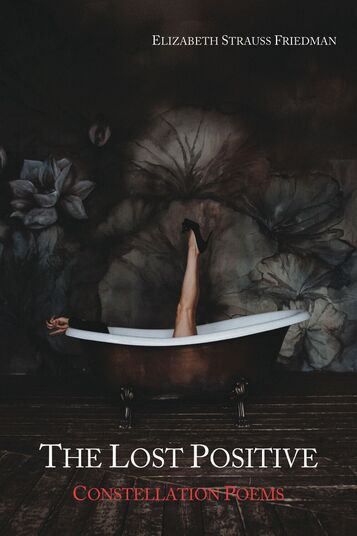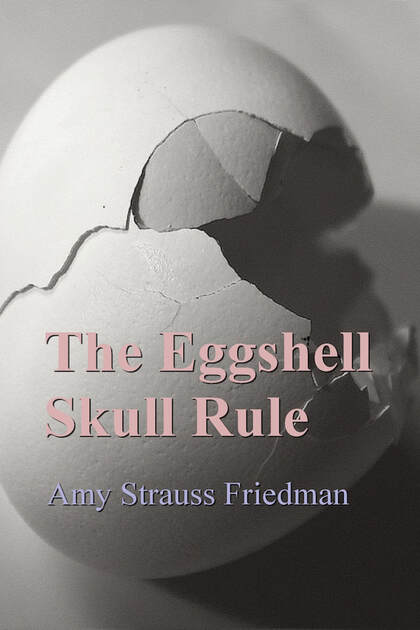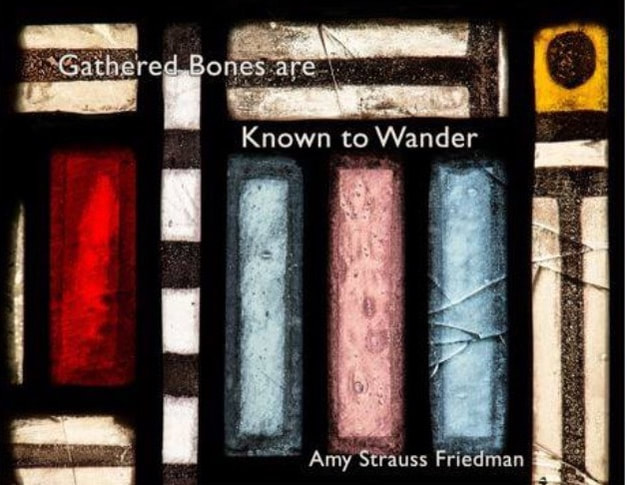|
The Lost Positive (BlazeVOX [books], 2023)
Read this book and you will never see the constellations in the same way again. Each poem opens into the woman behind the myth, who has been hidden in darkness, or misconstrued as object or conquest. Strauss Friedman ventriloquizes the voices of these women with agility and originality, moving through wit, stunning intelligence, tenderness, and lyricism, as she both revises our take on history and speaks clearly to our present conundrums. This is a book we’ve been needing, and it took my breath away with its world-weary knowing. These voices are “As women ought to be,” alive “outside male invalidation / advertently galloping into stardust.” -- Rachel Jamison Webster, author of September and Mary is a River In The Lost Positive, her stellar second collection of poetry, Elizabeth Strauss Friedman casts the slog of domestic, compulsory heterosexuality into the stars—the result is a new mythology, “a wandering bruise / of glamour,” in which women refuse to negatively refract. Figures like Medea, Medusa, and Ariadne are recast, consorting with the likes of Tori Amos and Gloria Steinem, now authorially empowered and self-possessed. These are poems of reclamation: the “Boss Ass Bitch” and the “diva immune to debasement” take back the patriarchal lore, “pulling in stars by the pail.” Masterfully inventive, The Lost Positive unravels female disenfranchisement until we are left pulsing with renewed agency, self-knowledge, and the urgency of foresight. --Jenny Molberg, author of The Court of No Record and Refusal: Poems Elizabeth Strauss Friedman’s The Lost Positive is a feminist tour de force. Her use of Euripides' epigraph from Medea in section one sets the stakes of this powerful and unrelenting collection— “Of all creatures that can feel and think, we women are the worst treated things alive.” Strauss Friedman uses ancient myths and stories of the constellations to highlight the coded and overt misogyny of our culture, and these poems thrum with abuses of women in our own time. This is a book where the speakers do not turn away from any horror or injustice so, at times, it takes its toll on them: “The more I learn of this world / the less I want of it.” In The Lost Positive, Strauss Friedman proves herself as a savvy cultural critic and a fiercely original poet at the height of her powers. Her ear for language—alliteration, slant rhyme, and lexical play—all serve to underscore the urgency of women's place in a post-Roe America. “My imagination my only unvarnished possession. / I weep for what I've lost. Or, for what I never had.” It’s a difficult task to write a collection of poems that is equally artistic and activist but The Lost Positive admirably succeeds. --Jennifer Franklin, author of If Some God Shakes Your House |
|
Order it on Amazon HERE
|
The Eggshell Skull Rule (Kelsay Books, 2018)
In The Eggshell Skull Rule, Strauss Friedman masterfully constructs a home from "a foundation of velvet" and "holy bricks." This is a home that becomes flesh, that becomes mystical in its emotional resonance, where "all wounds fasten memory at bone level." Strauss Friedman’s home is a gorgeously human place of "growling beauty," of "celestial livers, kidneys,/guts, hearts." The poems in this debut collection take my breath away with their unceasing pressure on words and on the relationships of the mother, the daughter, the family. The Eggshell Skull Rulebears witness to the resilience of language, love, and a heart that throbs: "Alive alive alive." —Jennifer Martelli, author of The Uncanny Valley and After Bird Strauss Friedman’s poetry evokes Janus, a god who gazed simultaneously at past and future. "We confront, we glass, we fragment/what once we forged," she writes, capturing the realization that what seemed to be iron might be the most fragile of all, poised to shatter. Her lines dart after mother and motherhood, old heartbreaks and uncertain futurescapes, all while struggling to inhabit the aching, brittle now. --Jessica Walsh, author of How to Break My Neck, The List of Last Tries, and Book of Gods and Grudges In Strauss Friedman’s The Eggshell Skull Rule, the bodies of mothers and daughters blend into one another and explode apart in alienating synchronicity, leaving the reader to reassemble their own ghosts and question if everything has been put back together. Strauss Friedman’s poems challenge us to scrutinize our own reflection in the mirror. Does your portrait actually look like you think it looks? She dissembles bodies: teeth are on the outside, blood is spilt. From the poem "She Who Never Presented Herself Even When Present”: "Forgive me for the blood that weeps from my hands.//But red was all I knew of climate,/all that seasoned my food." Perhaps catastrophic relationships slice us open and we survive; perhaps not. --Jennifer MacBain-Stephens, author of Your Best Asset is a White Lace Dressand The Messenger is Already Dead. |


